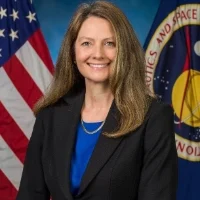
Angela T. Hart
Commercial Low Earth Orbit (LEO) Development Program NASA
Angela Hart serves as Program Manager for the recently established Commercial LEO Development Program Office at Johnson Space Center to manage the implementation of the Agency’s Commercial LEO strategy. The primary goal is to facilitate the development of commercially owned and operated LEO destinations from which NASA, along with other customers, can purchase services and stimulate the growth of commercial activities in LEO. It also includes a focused effort to maintain a continuous US human presence in LEO – with both government astronauts and private citizens. This strategy will allow NASA to maximize its resources toward missions beyond LEO, while still having the ability to utilize LEO for its ongoing needs.
Hart attended Cornell University in Ithaca, New York where she earned a bachelor’s degree in Operations Research and Industrial Engineering in 1988. After graduation, she served for seven years in the U.S. Army serving as a Hawk Missile Air Defense Artillery and Military Intelligence Officer attaining the rank of captain. She transitioned from her final military position serving as an Intelligence Analyst for the Texas National Guard Counterdrug Task force to a criminal investigator for the U.S. Food and Drug Administration.
She began her NASA career at Johnson in 1996, leading Pressurized Cargo Integration planning for the International Space Station Program.
In 2007, Hart moved to the Orion program managing the Vehicle Flight and Ground Operations team responsible for developing and evaluating operations requirements and systems.
She left Orion to follow her passion in commercial space flight and supported the original Commercial Resupply Services (CRS) Contract as the Contracting Officer Representative (COR) helping to lay the foundation and interpretation of this early ISS fixed price contract. Leading into the first test flight, she was asked to take on the duties of the SpaceX Visiting Vehicle Integration Manager responsible for the completion of the mission specific and ISS visiting vehicle verification requirements for the early SPX to ISS test flights and the first nine CRS contract flights. In this role, she worked closely with SpaceX to help ensure the company developed and refined the Cargo Dragon 1 spacecraft met the cargo and payload capabilities required by the International Space Station.
After CRS Mission 9, she transitioned as the ISS Commercial Crew Integration Manager responsible for working closely with both SpaceX and Boeing CCP partners in their development efforts to meet the ISS visiting vehicle requirements and service needs for crew.
She moved to the Commercial Crew Program to assist in the reorganization of the Mission Integration and Management Office responsible for development and execution of the program’s plans for mission integration, scheduling, mission specific analysis, manifesting and Certification of Flight Readiness.
Additionally, she was asked to develop and implement an extremely lean and commercially partnered real-time mission support architecture that provided the required NASA insight and oversight for human spaceflight but also provided for a greater responsibility by the commercial partner. She oversaw these activities for the successful Dragon Demo 1, 2 and Crew 1 missions and the initial OFT flight before fully transitioning to her new role.